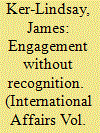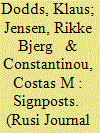|
|
|
Sort Order |
|
|
|
Items / Page
|
|
|
|
|
|
|
| Srl | Item |
| 1 |
ID:
138346


|
|
|
|
|
| Summary/Abstract |
This article examines the extent to which states are able to interact at an official level with a contested or de facto state—a state that has unilaterally declared independence but is not a member of the United Nations—without being understood to have recognized it. This is an area of increasing interest and relevance to policy-makers as the number of contested states has grown in recent years. In many cases, interaction may be important for ongoing peace efforts. However, there are also instances when a state is prevented from recognizing the territory in question for specific domestic or foreign policy reasons and so has to find alternative means by which to cooperate. Drawing on several key examples, notably Kosovo and the ‘Turkish Republic of Northern Cyprus’, but also with reference to Abkhazia, the article explores the limits of interaction across various different forms of bilateral and multilateral diplomatic activity. As is shown, albeit with some significant provisos, legal theory and historic practice suggest that diplomatic engagement does not constitute recognition if there is no underlying intent to recognize. This means that there is in fact a very high degree of latitude regarding the limits of diplomatic engagement with contested states. This is especially the case in bilateral contexts. Indeed, in some circumstances, the level of engagement can even amount to recognition in all but name.
|
|
|
|
|
|
|
|
|
|
|
|
|
|
|
|
| 2 |
ID:
171815


|
|
|
|
|
| Summary/Abstract |
This article explores the role of the EU in unrecognised, also known as contested, states and more specifically, how their level of international recognition and empirical statehood (i.e. government authority and control) influence the EU’s engagement. By studying the case of the Turkish Republic of Northern Cyprus, the article finds that the EU engagement takes the form of ‘state avoidance’, mostly characterised by an effort to engage without endorsing state recognition and manifested via a) sui generis management of unrecognised borders, b) informal engagement with officials of the unrecognised state, c) replacement of public authorities with non-state actors and d) extensive engagement with civil society. In this regard, the article offers a range of causal explanations that can be tested across a greater number of similar cases. What is more, I contrast state avoidance to state-building approaches evident in aspiring states with more recognition but greater deficit of empirical statehood, such as Kosovo and Palestine, and I argue for a broader conceptualisation of the phenomenon of unrecognised states, allowing for variation in both the degree of recognition and of empirical statehood. As such, the article combines a discussion of rich empirical findings and inductive concept-building that contributes to a more informed discussion and further research development, especially as far as engagement from the EU is concerned.
|
|
|
|
|
|
|
|
|
|
|
|
|
|
|
|
| 3 |
ID:
155064


|
|
|
|
|
| Summary/Abstract |
The role of Great Powers in processes of secession and recognition has attracted increasing attention from scholars in recent years. This analysis examines how Britain rallied international opposition to the November 1983 unilateral declaration of independence [UDI] of the “Turkish Republic of Northern Cyprus” [TRNC]. The British Government tried hard to prevent the UDI. Once it occurred, Britain led efforts to condemn the move. It resulted in United Nations Security Council Resolution 541, which declared the TRNC illegal and called on states not to recognise it. As well as exploring the diplomacy behind the counter-secession efforts, this examination also answers a long-standing question as to whether any countries aside from Turkey ever recognised the TRNC. It also challenges the widely held view amongst Greek Cypriots that Britain invariably supports the Turkish Cypriots on the Cyprus Problem.
|
|
|
|
|
|
|
|
|
|
|
|
|
|
|
|
| 4 |
ID:
107319


|
|
|
|
|
| Publication |
2011.
|
| Summary/Abstract |
Unrecognized claimants to statehood (UCSs), as referred to in this article, are political communities that meet many of the criteria of a state according to international law, but whose claims to statehood do not receive unequivocal recognition by existing states generally or collective recognition by the international community as a whole through admission to the United Notions as a member-state. Since the end of World War II, a considerable number of UCSs have emerged under varied circumstances, such as protracted conflict within a state, secession, or as a result of a collective policy of non-recognition by the international community. This article suggests that although the lack of general recognition does affect the international legal position of a UCS and the exercise of its rights and duties, it does not render such an entity legally nonexistent. Generally speaking, where the existence of a UCS does not involve a violation of international law, other states have acknowledged the separate international legal capacity of that entity and conducted extensive dealings with it. By contrast, where a UCS is created by acts violating international law, a collective policy of non-recognition can become alarm of sanction that leads to greater limitations on the dealings of the entity concerned with the inter-national community, to the extent that its separate identity under international law may become doubtful. A comparative analysis of Taiwan and the Turkish Republic of Northern Cyprus reflects a considerable degree of consistency in state practice as regards how the positions of UCSs are tackled under international law.
|
|
|
|
|
|
|
|
|
|
|
|
|
|
|
|
| 5 |
ID:
141676


|
|
|
|
|
| Summary/Abstract |
The UK Sovereign Base Areas (SBAs) in Cyprus are products of the terms and conditions attached to Cypriot independence in 1960, and are highly unusual territorial and political entities. Since the 1974 division of the island, the SBAs have co-existed with the Republic of Cyprus, the unilaterally declared Turkish Republic of Northern Cyprus and a UN-administered Buffer Zone. Recent reunification talks between the Greek Cypriots and Turkish Cypriots hold out the promise of change, however. Klaus Dodds, Rikke Bjerg Jensen and Costas M Constantinou explore ‘signposts’ of the changing landscape – both figuratively and literally – that help make sense of the current situation and also illuminate three possible future scenarios facing Cyprus, the UK and its SBAs.
|
|
|
|
|
|
|
|
|
|
|
|
|
|
|
|
|
|
|
|
|